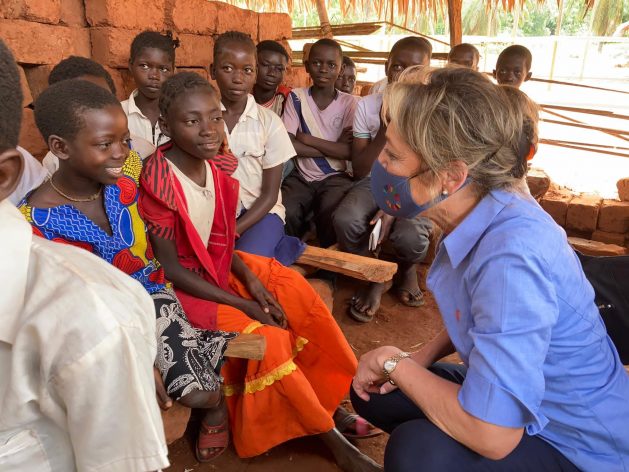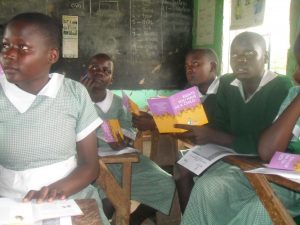ECW Joins Call to Action on Protection from Gender-Based Violence in Emergencies: Global Community Urged to Orange the World and End Gender-Based Violence Now

Dec 09 (IPS) - The statistics are dire: One in three women have experienced a form of gender-based violence in their lifetime, be it sexual violence, physical violence, or child marriage. The message is clear: Women and girls deserve a safer, brighter future – free from gender-based violence.
For those living in protracted crises, the risks are compounded as these often create new risks for girls forced to travel long distances to and from schools and learning spaces, or the lack of safe and gender-segregated WASH facilities. These risks, in turn, often compel families to keep their girls out of school and even to marry them off as children to reduce the risk of gender-based violence in and around schools.
This is why Education Cannot Wait (ECW) – the UN global fund for education in emergencies - has become the first global fund to join the Call to Action on Protection from Gender-Based Violence in Emergencies. The ‘Call to Action’ is a multi-stakeholder initiative to transform how gender-based violence is addressed in humanitarian emergencies. ECW made the announcement during the ‘16 Days of Activism against Violence against Women and Girls’ campaign that kicked off on November 25 and ends on December 10.
“To no one is the campaign so real as it is for girls and adolescent girls who want to go to school, but face gender-based violence in emergency and protracted crisis contexts. These girls fear for their lives, they fear for their security, and they desperately need safe learning spaces so they can reach their full potential and be assured of their inherent human right to live free from fear and violence and to quality education,” said Yasmine Sherif, Director of Education Cannot Wait.

Sherif is talking about the one in four children in Africa who live in conflict zones. She is also referring to UNESCO projections which show that 9 million girls between 6-11 years of age - compared with 6 million boys of the same age - living in sub-Saharan Africa will never go to school. These estimates were before the COVID-19 pandemic. Now, with school closures and COVID-19 restrictions, the situation has worsened.
The United Nations estimates that women and girls together account for 72 per cent of all human trafficking victims reported globally. Three out of four child trafficking victims are girls. A majority of women and girls are trafficked for the purpose of sexual exploitation. Globally, 15 million adolescent girls, aged 15–19 years, have experienced forced sex.
ECW points out that in armed conflicts, forced displacement, climate-induced disasters and protracted crises, gender-based violence risks are exacerbated, increasing the challenges already faced by girls, adolescent girls and women, as they are disproportionately affected by the impact of emergencies on education.
Although education is a fundamental human right for all children and adolescents, ECW finds that families are more likely to prioritize boys’ education, choosing not to pay for girls’ school fees, uniforms and other supplies as a result of the economic impact of armed conflicts, forced displacement and other crises.
Sherif and other experts in girls’ education emphasize that better-designed education programmes with a strong, gender-sensitive, protection component can help mitigate such risk – by keeping girls and women safer and supporting them when they experience gender-based violence. This provides them with the skills and knowledge they need to improve their own lives.
Joining forces with more than 95 stakeholders including governments, UN agencies, international NGOs, donors, and local civil society organizations, ECW “aims to contribute to change and foster accountability from the humanitarian system to address gender-based violence from the earliest phases of a crisis.”

As the United Nations global fund for education in emergencies and protracted crises, ECW is positioned to make and implement bold commitments to support gender-based violence risk mitigation.
The 16 Days campaign, which this year has the theme, ‘Orange the world: End violence against women now!’, has become an important rallying point to raise awareness and make a difference.
Mary Chepkwony, a field coordinator for the Kenya-based Rural Women Peace Link tells IPS that bold commitments to safeguard the rights of women, girls and adolescent girls are timely and critical.
“Gender-based violence cases are on an unprecedented increase, hence the need to strengthen local- and rural-based women organizations to improve the safety and security of women and girls,” she says.
Concerns are rife that COVID-19-driven economic insecurity is increasing girls and women’s vulnerability to gender-based violence in homes globally. Additionally, school-related gender-based violence is a major obstacle to universal schooling and the right to education for girls.
Meaningful partnerships with local women organizations are crucial for the design and implementation of safe, quality and inclusive education to ensure that girls are not left behind.
“This week, Education Cannot Wait launched two new guidance notes on gender-based violence risk mitigation measures and meaningful engagement of local women organizations,” says Sherif. These guidance notes will help ECW and its partners to support commitments to eliminate gender-based violence risks among women, girls and adolescent girls.
These short and practical guidance notes are based on global best practices and are being systematically integrated in the design and implementation of EWC-supported investments.
“We firmly believe that education in emergencies and protracted crises can greatly contribute to reducing the incidence of gender-based violence by creating safer education in emergency programming. Girls’ access, retention, and learning outcomes can only increase, creating a lasting positive impact on their communities,” says Sherif.
She explains that education in emergencies programming and protection - particularly gender-based violence risk mitigation - reinforce each other and when combined, can lead to positive outcomes for girls and their communities.
Chepkwony applauds these efforts, saying ongoing risk mitigation efforts around the world are a step in the right direction for the safety of women and girls.
ECW already supports these risk mitigation measures across its broad global portfolio. For instance, in Syria and Somalia, referral mechanisms to the gender-based violence sub-cluster were established to ensure disclosure of cases are dealt with according to best practice.
Follow @IPSNewsUNBureau
Follow IPS News UN Bureau on Instagram
© Inter Press Service (2021) — All Rights Reserved. Original source: Inter Press Service
 Global Issues
Global Issues